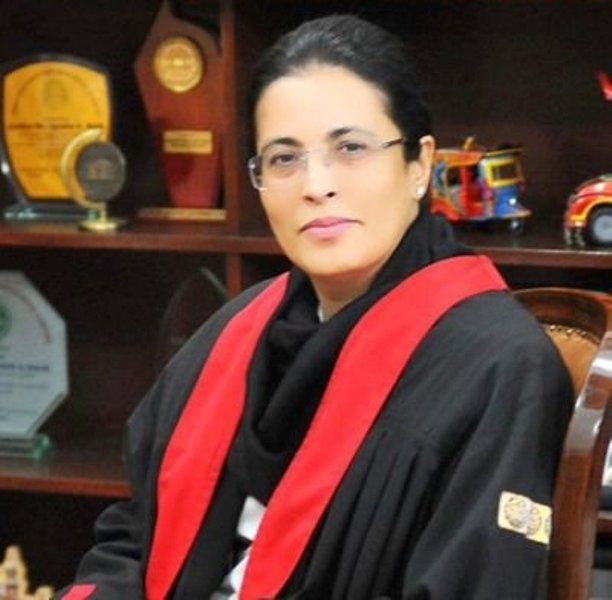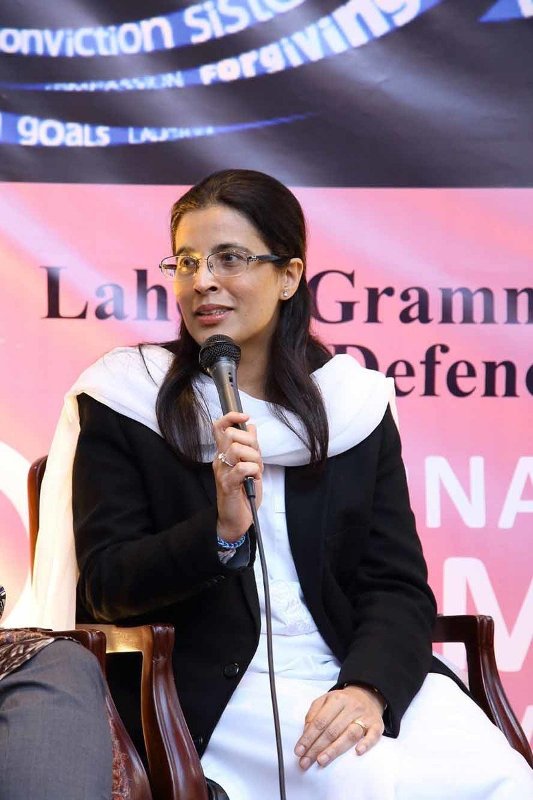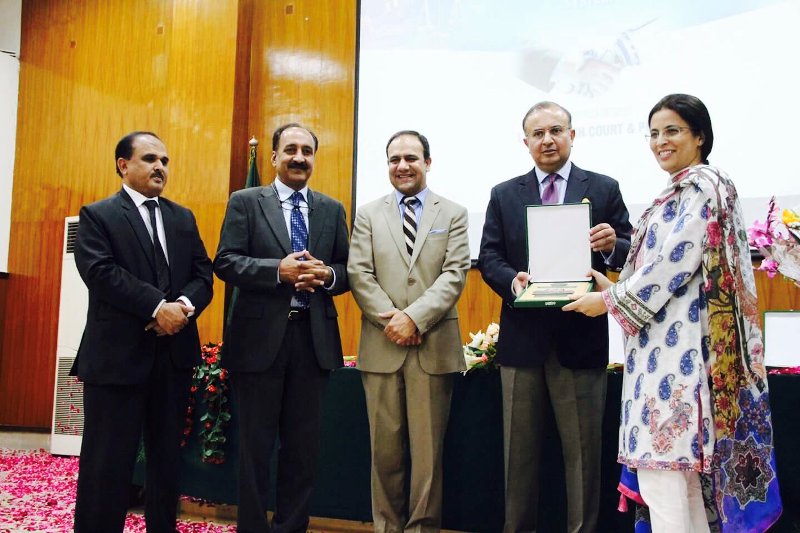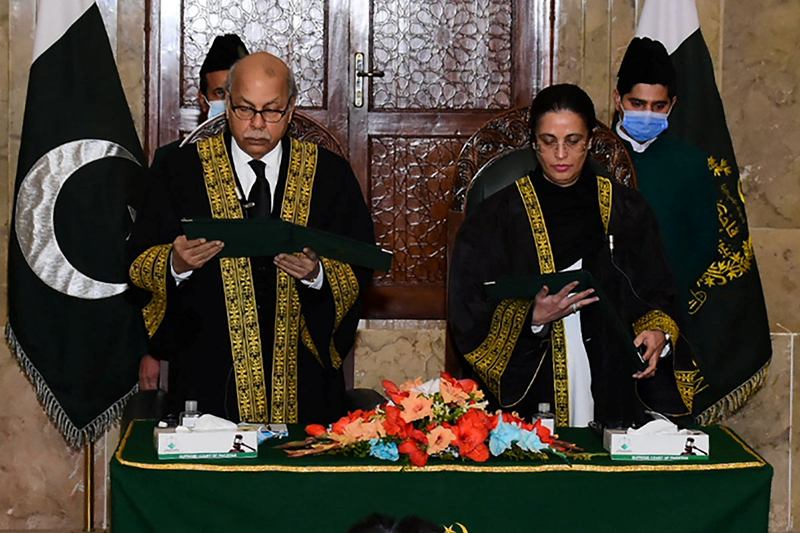Justice Ayesha Malik Age, Husband, Children, Family, Biography & More
| Bio/Wiki | |
|---|---|
| Full name | Ayesha A. Malik [1]ABC News |
| Profession | Judicial Personnel |
| Known for | Being the first ever female judge of the Supreme Court of Pakistan |
| Physical Stats & More | |
| Eye Colour | Black |
| Hair Colour | Black |
| Judicial Career | |
| Positions Held (major ones) | • Justice of the Lahore High Court (27 March 2012 – 5 January 2022) • Justice of the Supreme Court of Pakistan (24 January 2022-present) |
| Personal Life | |
| Date of Birth | 3 June 1966 (Friday) |
| Age (as of 2021) | 55 Years |
| Birthplace | Karachi, Pakistan |
| Zodiac sign | Gemini |
| Nationality | Pakistani |
| Hometown | Karachi, Pakistan |
| School | • Karachi Grammar School, Karachi • Francis Holland School, London |
| College/University | • Government College of Commerce & Economics, Karachi, Pakistan • Pakistan College of Law, Lahore, Pakistan • Harvard Law School, Cambridge, Massachusetts, U.S.A. |
| Educational Qualification(s) [2]The Indian Express | • Bachelor of Commerce from the Government College of Commerce & Economics • Bachelor of Laws from Pakistan College of Law • LL.M from Harvard Law School |
| Relationships & More | |
| Marital Status | Married |
| Family | |
| Husband/Spouse | Humayun Ehsan (principal and lawyer of a private law college) |
| Children | She has three children. |
Some Lesser Known Facts About Ayesha Malik
-
Who is Ayesha Malik?:
Ayesha Malik is Pakistani judicial personnel who made headlines in January 2022 when she became the first-ever female judge of the Supreme Court of Pakistan.
-
Growing up & Education:
Ayesha grew up receiving her basic education from different schools including in Paris and New York. After pursuing her A levels at Francis Holland School for Girls in London, Ayesha studied Senior Cambridge at the Karachi Grammar School in Karachi. Then, she earned a bachelor’s degree in commerce from the Government College of Commerce & Economics, Karachi. Later, she pursued her initial legal studies at Pakistan College of Law, Lahore, and then she went on to attend Harvard Law School, Cambridge, Massachusetts, U.S.A., where she did her LL.M. While pursuing her higher studies at Harvard University, Ayesha was named a London H. Gammon Fellow 1998-1999 for outstanding merit. [3]The Indian Express
-
Initial Legal Career:
From 1997 to 2001, Ayesha Malik worked at Fakhruddin G. Ebrahim & Co., where she assisted Mr. Fakhurddin G. Ebrahim. Then, she joined Rizvi, Isa, Afridi & Angell (RIAA), where she worked initially as a Senior Associate from 2001 to 2004, and then as a partner from March 2004 to 2012 during which Ayesha spearheaded the firm’s Corporate & Litigation Department while working as in Charge of the Firm’s Lahore Office.
-
Legal Practice:
Ayesha Malik has a wide experience of legal practice that consists of appearances in the High Courts, District Courts, Banking Courts, Special Tribunals, and Arbitration Tribunals. Apart from Pakistan, she has also worked in England and Australia, where she worked as an expert witness in family law cases involving issues of child custody, divorce, women’s rights, and constitutional protection for women.
-
Educator:
Ayesha has provided her services as a legal educator at the University of Punjab, Department of Masters of Business and Information Technology, where she taught Banking Law. She has also taught Banking Law at Mercantile Law at College of Accounting & Management Sciences, Karachi. Apart from this, she is known for developing a course on ‘gender sensitization for court processes’ for the Board of the Punjab Judicial Academy. She is also known for compiling a handbook on environmental laws for facilitating the courts on dealing with environmental matters.
-
Philanthropy:
Ayesha has actively worked as a counsel for many NGOs that are involved in poverty alleviation programs, microfinance programs, and skills training programs. She has also volunteered as an English language teacher at SOS Herman Gmeiner School in Lahore for many years.
-
Author & Reporter:
While working in various capacities in law firms, Ayesha Malik authored a number of publications on trade and financial services, and she also wrote extensively on the issues of judicial independence and Pakistan’s secular laws. Moreover, Malik has also provided her services as a reporter for the Oxford Reports on the International Law in the Domestic Courts, a publication of the Oxford University Press. [4]The Indian Express
-
Justice of Lahore High Court:
On 27 March 2012, Ayesha Malik was appointed as Justice of Lahore High Court, becoming one of the first women to be elevated to the Lahore High Court. In 2019, she was appointed the president of the committee for the protection of women judges in Lahore; the committee was formed to address hooliganism against women judges by lawyers in district courts. [5]ABC News During her tenure at the Lahore High Court, Justice Ayesha Malik, who is known for her discipline and integrity, delivered a number of landmark verdicts on many significant issues including the enforcement of international arbitration in Pakistan, declaration of assets in elections, and a ban on carrying out virginity tests on female rape survivors. [6]The Indian Express
-
Banned “two-finger test”:
Ayesha made international headlines for the first time when she banned the controversial “two-finger test” that was used during rape-case investigations to determine a woman’s level of sexual activity. According to Ayesha, the tests were “humiliating” and had “no forensic value.” In her ruling, Ayesha emphasized that the procedure was “highly invasive” and met “no scientific or medical requirement.” [7]ABC News
-
First Female Judge of the Supreme Court of Pakistan:
In January 2022, Pakistan’s judicial commission confirmed the nomination of the first female judge at the Supreme Court, paving the way for Justice Ayesha A. Malik to join the apex court in the Muslim-majority nation’s history. Many lawyers, activists, and civil society groups supported her nomination including Pakistan’s Chief Justice Gulzar Ahmed. On this development, Maleeka Bokhari, a legislator from the ruling party and parliamentary secretary for law and justice, said,
This is an important development for Pakistan. She is a competent judge and a role model for women in the judicial and legal field.”
On 24 January 2022, Ayesha Malik took an oath as Justice of the Supreme Court of Pakistan. While welcoming her appointment, the Human Rights Commission of Pakistan (HRCP), an independent rights organisation, released a statement that read,
As the first woman judge appointed to the apex court in the country’s judicial history, this is an important step towards improving gender diversity in the judiciary, where women reportedly account for only 17% of judges overall and just under 4.4% in the high courts.”
Nighat Dad, a digital rights lawyer and human rights activist, quoted,
It has definitely broken the glass ceiling. This will have an impact on cases, not specifically those related to gender, but having a woman judge there will be increased confidence among women to access justice and reach out to the courts.”
The Netherlands Ambassador to Pakistan called Justice Malik’s elevation a “good start to 2022.” [8]ABC News
-
Controversial Appointment?:
Although many hailed the judicial commission’s move to elevate her to the Supreme Court, it sparked controversy as many lawyers and even judges alleged that Malik’s elevation to the Supreme Court was in violation of the seniority list. [9]The Indian Expres Imaan Mazari, an Islamabad-based lawyer and rights activist, while expressing his dissent over Malik’s appointment, said,
There is no question more representation of women is needed in the judiciary. Having a woman there is a positive development but we cannot condone the process through which arbitrary and non-transparent decisions have been made — not just in this instance but prior to this appointment as well.”
Mazari added,
I don’t think the opposition of the bar should have been made controversial — it was not specific to Justice Ayesha Malik, nor did anyone question her competence as a judge. The debate was over the judicial commission’s process.”
References/Sources:













